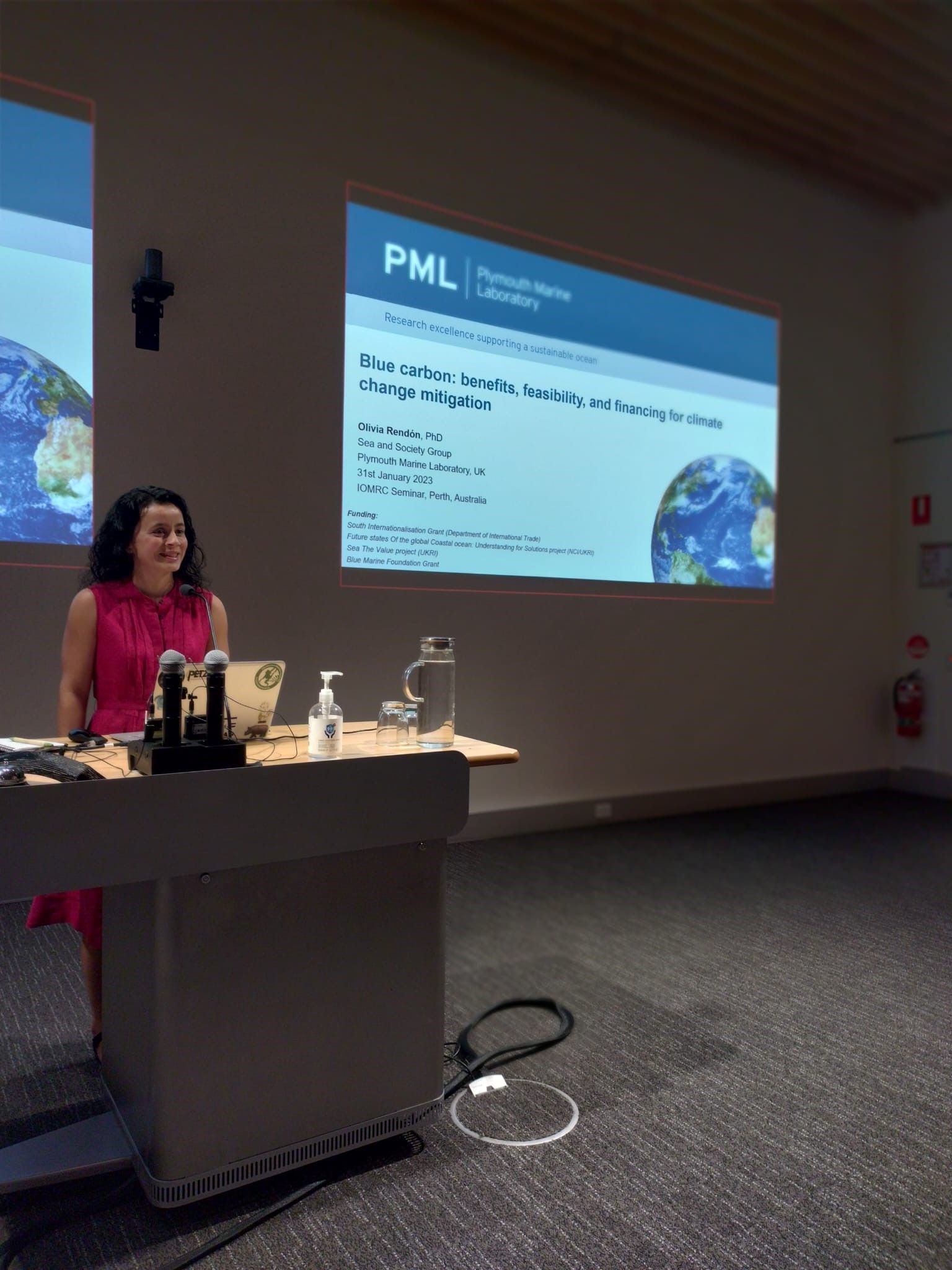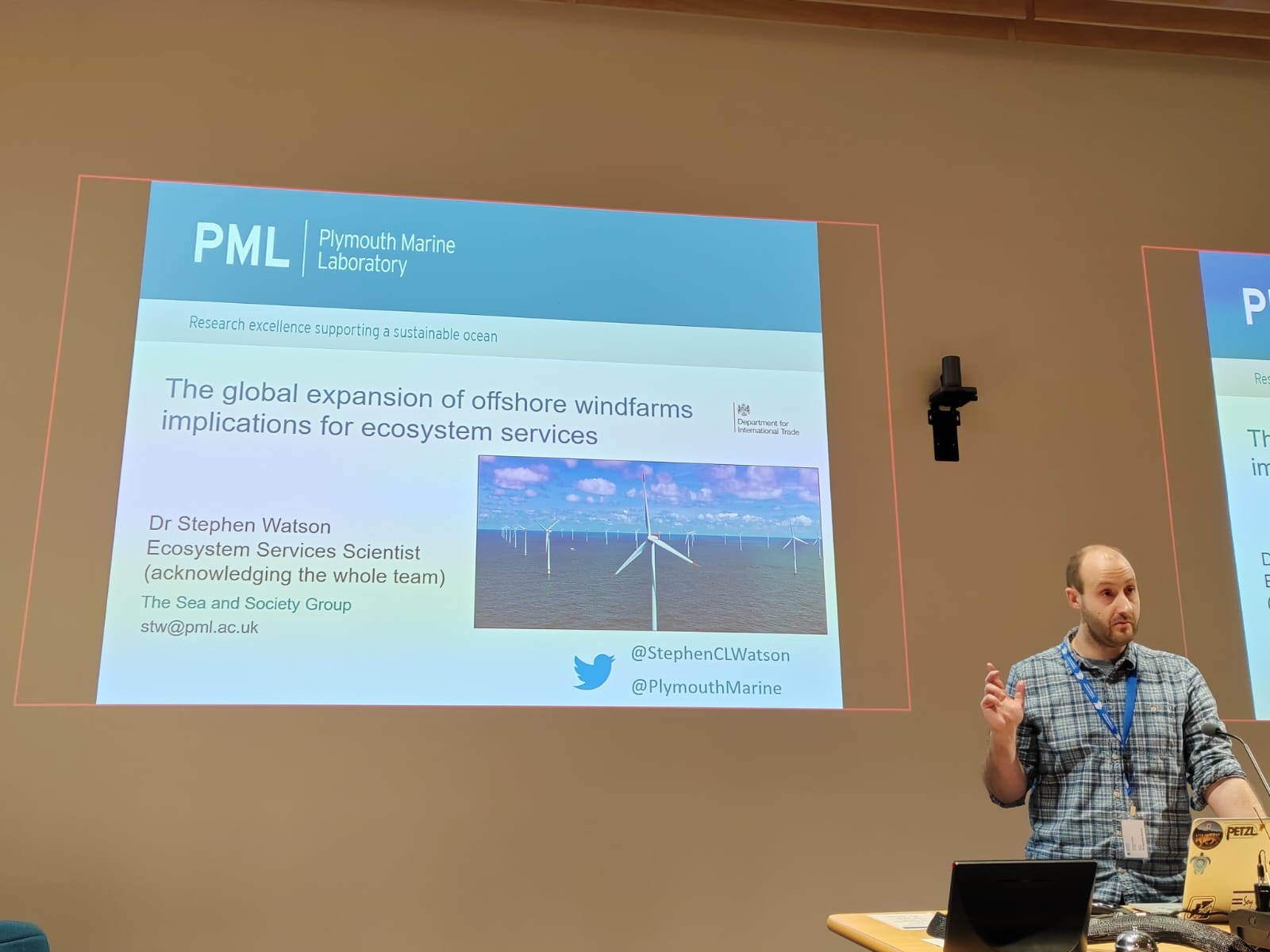Story
PML scientists visit Indian Ocean Marine Research Centre to discuss blue carbon and offshore energy
31 January 2023

Plymouth Marine Laboratory’s Dr Olivia Rendon and Dr Stephen Watson visited the University of Western Australia (UWA) this week to deliver a seminar on social and economic research on blue carbon and marine renewables or offshore renewables to the Indian Ocean Marine Research Centre (IOMRC)
The IOMRC is a leading marine science partnership in the southern hemisphere, with the largest marine research capability on the Indian Ocean rim.
It brings together four of Australia’s leading research organisations working in and around the Indian Ocean: the Australian Institute of Marine Science (AIMS), the Commonwealth Science and Industrial Research Organisation (CSIRO), the WA Department of Primary Industries (DPIRD) and The University of Western Australia (UWA).
Both Dr Rendon and Dr Watson are a part of PML’s Sea and Society group, which pioneers innovative research approaches that support the effective and sustainable management of marine and coastal systems and activities. This is designed to increase the benefits provided to society by the sea while conserving and enhancing the environment.
Dr Rendon, an Environmental Ecologist within our Sea and Society research group at PML, presented: “Blue carbon: benefits, feasibility, and financing for climate change mitigation”.
She describes the focus of her presentation:
“There is an increasing global interest in developing blue carbon schemes to meet net zero targets and to restore natural habitats for biodiversity conservation. However, there is an urgent need for research into clarifying the value of blue carbon and its wider co-benefits, as well as the feasibility of blue carbon development and sustainable financing in different contexts. An improved understanding is vital to enhance the role of blue carbon in climate change mitigation and wider global goals.”
“My presentation today outlined some of our current blue carbon work, which applies state-of-the-art valuation and ecosystem service approaches to understand the benefits of blue carbon in both developed and ODA countries. This includes understanding the key financial constraints and enablers that underpin the successful development of blue carbon and other nature-based solutions.”

Pictured above: Dr Rendon delivering the seminar
Dr Watson, Ecosystem Services Scientist, presented on the topic of offshore renewables: “The global expansion of offshore windfarms: implications for ecosystem services”.
He describes the focus of his presentation:
“Similar to the rise of global interest in blue carbon, many countries around the world are busy planning major expansions in the scale and extent of offshore wind farms (OWF). If done sustainably, these could help to accelerate the clean energy transition, contribute towards international Net Zero emission targets, while also potentially reversing biodiversity loss and aiding in restoring degraded ecosystems. An improved understanding of the social and environmental impacts of this sector, and how they compare with those of other energy systems, is therefore vital to support energy policy and planning decisions.”
“My presentation outlines some of the latest renewable energy work of the Sea and Society group (SaS) at PML which applies ecosystem service and natural capital approaches to better understand the environmental and social implications of changes in the global OWF energy system. This includes understanding the key ecological and biogeochemical ecosystem attributes and processes that underpin those services.”
“Recently PML has established an Energy Research Community Group with the aim to expand and interact more with other international research groups with a mutual interest in offshore renewables. By developing new collaborations and partnerships across renewable energy systems, there is potential to develop and validate new socio-environmental databases, tools and models to support the confident prediction of future OWF deployment, operation and decommissioning. By working together, new knowledge and expertise will provide a major contribution to ensuring that energy and natural capital policies can be developed in a coherent manner for the maximal benefit of society as a whole.”

Pictured above: Dr Watson delivering the seminar
The visit was funded with thanks to a grant from the Department for International Trade.
The visit this week builds on a longstanding Memorandum of Understanding between PML and the Australian Institute of Marine Science (AIMS), which celebrated its 50th anniversary last year (2022).
Professor Icarus Allen, Chief Executive of PML, added:
“Collaboration and information-sharing is, and always has been, key to advancing science and developing best-practice. It has also been a valuable opportunity to learn from others in the sector, who are also developing world-class, cutting-edge research; thereby supporting our collective mission of a more sustainable ocean future.”
